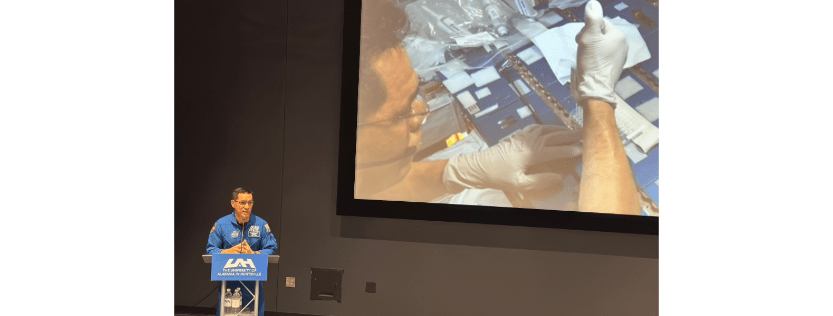NASA Astronaut Frank Rubio Visits UAH Campus, Shares Career and Life Advice with Students
Last week, NASA Astronaut Frank Rubio spoke to University of Alabama in Huntsville students on campus at the Charger Union Theater, discussing his storied career and path to becoming a space explorer.
By all accounts, Rubio has an impressive resume. In addition to his role as an astronaut, he is a board-certified family physician, flight surgeon, and U.S. Army Colonel who has served multiple overseas tours. He also holds the record for the longest single spaceflight by a U.S. astronaut, spending 371 days aboard the International Space Station.
At one time, Rubio also worked at Redstone Arsenal as a clinic supervisor, an executive medicine provider, and a flight surgeon.
But for UAH students who recently heard Rubio speak, it’s not just his extraordinary list of accomplishments they will remember, but his kindness and willingness to share detailed career and life advice with them.
“It’s always an honor to talk to students. You guys represent the future of our nation, and it’s exciting for guys like me who’ve kind of been there, done that, to see the potential that you guys have and that you represent for our nation.” Rubio said.
Rubio began the event by taking a few minutes narrating over a video of his time in space. In addition to detailing what work he did while in orbit, he talked about what stood out the most to him.
Rubio told the audience that one of his favorite parts of the mission was looking out the window at the Earth, seeing about 30 sunrises and sunsets each day, as well as colorful auroras.
“It is always pretty special to look out the window. The view of the Earth and our planet, and how unique it is in the solar system, is by far the most special experience. It’s quite a unique perspective, and obviously, we’re blessed to have that opportunity,” Rubio said.
When asked by students about what it takes to become a NASA astronaut, Rubio candidly explained what the organization looks for in a candidate.
“What we look for in astronauts, and this is kind of funny, but it’s actually true, is either nerdy explorers or adventurous nerds. Either way, it’s kind of a combination of that. You have to have the academic background to show that you can handle the workload that we experience,” Rubio said.
As for what a student needs to study or major in to become an astronaut, Rubio said having a STEM background is helpful. Rubio also noted that those selected to become astronauts often have a diverse blend of backgrounds and experiences, which vary from person to person.
Ultimately, he told students that it comes down to having a strong education, an operational background, such as the military or something similar, and the willingness to collaborate with others.
“Everything in life is team skills. Can you fit on our team? Are you somebody that we want to work with? Are you a good person? And that part is not unique to NASA; that applies to anywhere at any job that you’re going to apply to,” Rubio said.
Although Rubio encouraged students to hold on to the dream of becoming an astronaut, he urged them not to make it their only career goal due to the slim possibility of being selected.
“Don’t make being an astronaut the one thing that you think will make you happy. It’s absolutely a goal that you should put up there and try to achieve. But then pick a career that makes you happy. And, if you never become an astronaut, you’ll be completely satisfied and happy with doing that career,” Rubio said.
Rubio expressed his gratitude for his role at NASA and for the United States.
“We’re grateful for what we do here at NASA, and it’s an honor to represent our nation and represent the people of America and the people of the world.”
He also highlighted NASA’s unique identity as a civilian agency.
“We actually take a great deal of pride in that. I think it buys us a huge amount of capital, not only with the nation, but with the world,” Rubio said.
Rubio went on to emphasize the global respect NASA enjoys, explaining that its unique role as a neutral organization sets it apart and helps foster goodwill both within the United States and around the world.
“Almost universally, it’s respected and liked. I think one of the big reasons for that is because we represent the goodness of what we can achieve as humanity in exploration, discovery, and innovation,” said Rubio.














